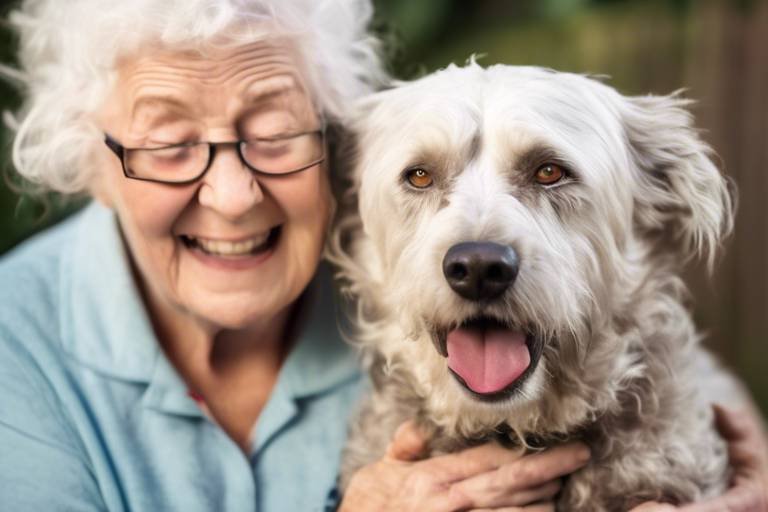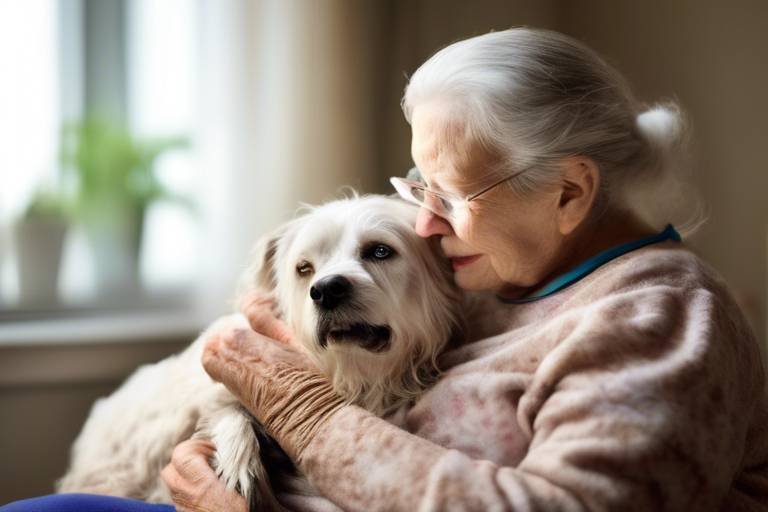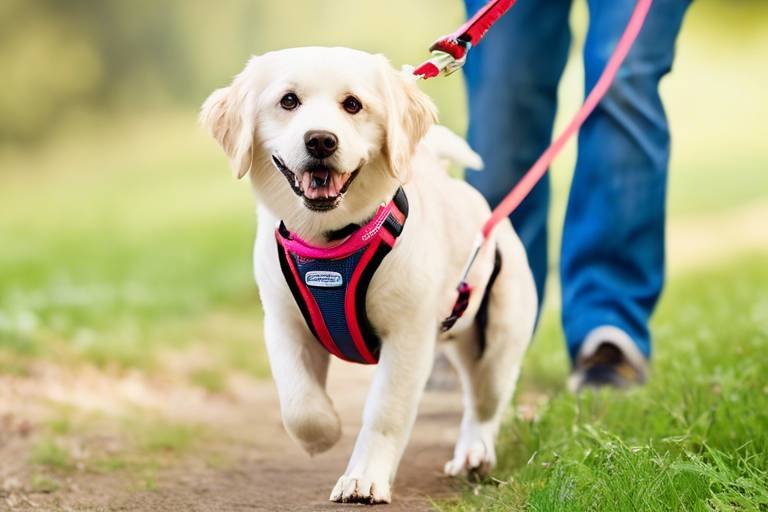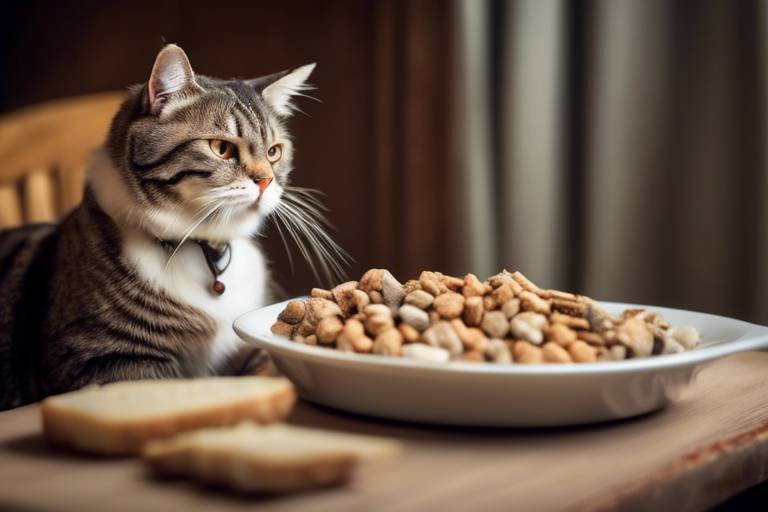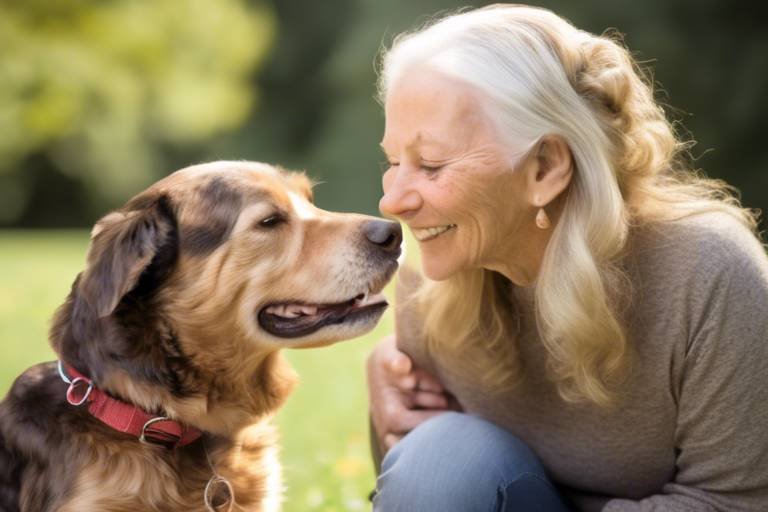Understanding the Role of Pet Sitters for Senior Animals
As our furry friends age, their needs change significantly, making it essential for pet owners to consider specialized care. This is where pet sitters come into play, providing not just a service, but a lifeline for senior animals. Imagine a world where your beloved pet is not only cared for but also feels loved and secure in your absence. Pet sitters are trained to understand the unique challenges that senior pets face, ensuring that these animals receive the attention and care they need to thrive.
Pet sitters are more than just caregivers; they are companions who understand the nuances of senior pet care. They help alleviate the stress of being away from home by providing consistent companionship and emotional support. This is particularly important for senior pets, who may experience anxiety or loneliness when their owners are not around. Just like us, pets can feel a sense of loss when their routine is disrupted. A pet sitter can help maintain this routine, ensuring that the pet feels comfortable and secure.
Furthermore, the role of a pet sitter extends beyond simple companionship. They are responsible for managing the health and well-being of senior animals. This includes administering medications, preparing special diets, and monitoring any changes in behavior or health. A knowledgeable pet sitter can make all the difference in the quality of life for an aging pet, keeping them comfortable and happy. They are the eyes and ears for pet owners, providing updates and insights that can be crucial for the pet's health.
In addition to health monitoring, pet sitters also engage in activities that stimulate the mental and physical well-being of senior pets. Gentle walks, interactive play, and even just sitting together can provide a sense of normalcy. After all, wouldn’t you want someone who not only cares for your pet but also enriches their daily life? This holistic approach to pet sitting can significantly enhance the quality of life for senior animals, making them feel cherished even when their owners are away.
Ultimately, the role of pet sitters for senior animals is vital. They are not just caretakers; they are advocates for the well-being of these beloved companions. By choosing a qualified pet sitter, pet owners can ensure that their senior pets receive the best care possible, allowing them to enjoy their golden years with comfort and happiness. So, the next time you think about leaving your senior pet at home, remember that a pet sitter can provide the care, companionship, and love that will keep your furry friend thriving.
Pet sitters provide essential support for senior pets, ensuring they receive proper care, companionship, and attention while their owners are away, ultimately enhancing the quality of life for these beloved animals.
Senior animals often require additional care due to health issues or mobility challenges. Understanding these needs is crucial for pet sitters to provide the best possible support and enhance the pet's well-being.
Many senior pets face health challenges such as arthritis, diabetes, or heart conditions. A knowledgeable pet sitter can recognize these issues and provide appropriate care, medication, and monitoring to ensure the pet remains comfortable.
Administering medication correctly is vital for senior pets. Pet sitters must be trained in medication schedules and dosages to guarantee that pets receive their treatments on time and safely.
Senior pets may have specific dietary restrictions or requirements. Pet sitters should be aware of these needs to ensure proper nutrition and avoid foods that could harm the pet’s health.
Senior pets can experience anxiety or loneliness, especially when their owners are away. Pet sitters play a key role in providing companionship and emotional support, helping to alleviate stress and promote a sense of security.
Selecting an appropriate pet sitter for senior animals involves evaluating their experience, knowledge of senior pet care, and ability to handle unique challenges, ensuring a perfect match for both pet and owner.
When hiring a pet sitter, it's essential to consider their qualifications and experience, particularly with senior animals, to ensure they are equipped to handle the specific needs and challenges that may arise.
Checking references and reading reviews from previous clients can provide valuable insights into a pet sitter's reliability and ability to care for senior pets, helping owners make informed decisions for their furry companions.
- What qualifications should I look for in a pet sitter for my senior pet? Look for experience with senior animals, knowledge of their specific needs, and positive references from previous clients.
- How can I ensure my pet sitter is reliable? Check reviews, ask for references, and conduct an interview to gauge their understanding of senior pet care.
- What should I prepare for my pet sitter before leaving? Provide detailed instructions on medication, dietary needs, and any special care routines your pet requires.
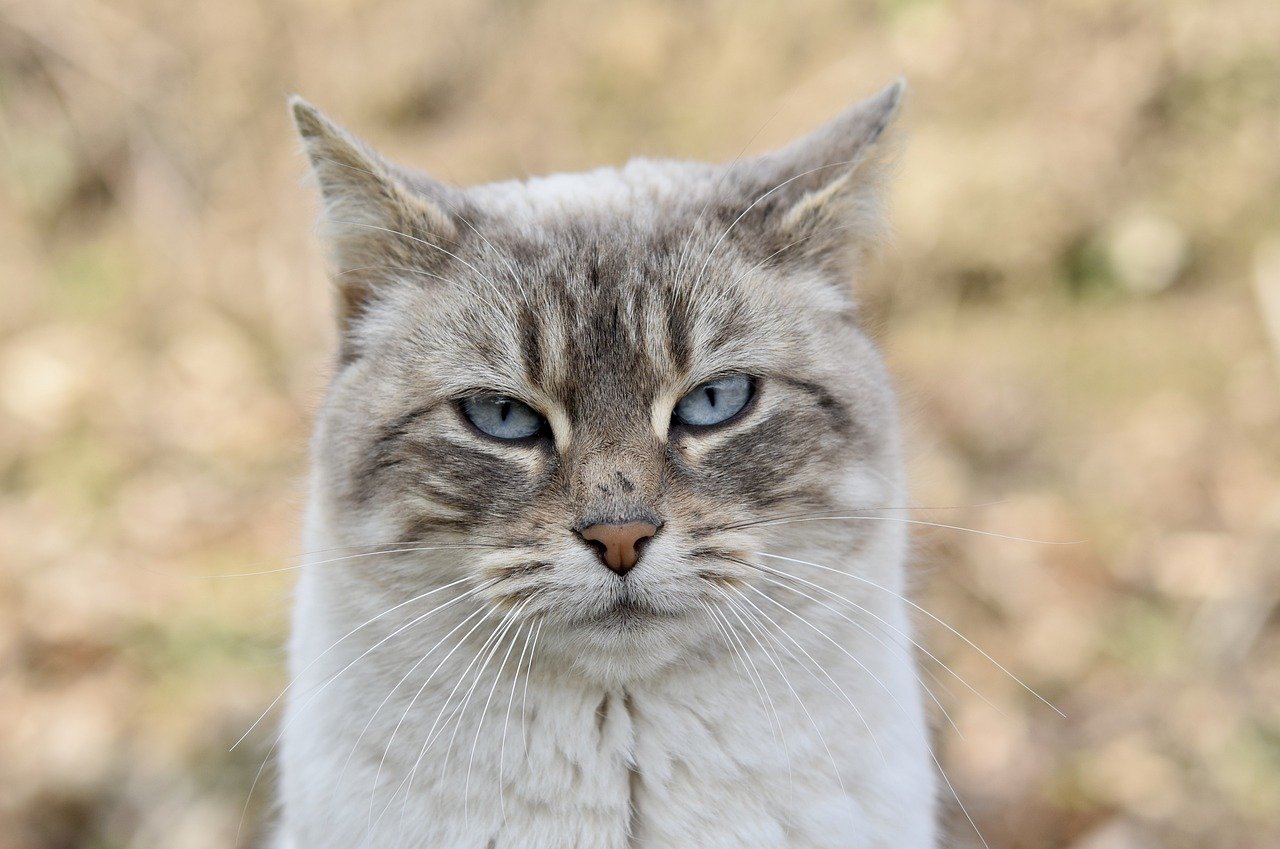
The Importance of Pet Sitters for Seniors
When it comes to caring for our furry friends, especially the older ones, pet sitters play an indispensable role. Imagine this: you have a beloved senior pet who has been your faithful companion for years. Now, due to work commitments or travel plans, you find yourself needing to leave them behind. This is where a skilled pet sitter steps in, ensuring that your senior animal receives the care and attention they deserve while you're away. Pet sitters provide more than just basic pet care; they offer a level of companionship and support that can significantly enhance the quality of life for senior pets.
Senior animals often face unique challenges that require specialized attention. They might be dealing with mobility issues, health complications, or even emotional distress when separated from their owners. A dedicated pet sitter understands these challenges and is equipped to provide the necessary support. For instance, they can help maintain a routine that includes regular feeding, exercise, and medication schedules, which is crucial for the well-being of older pets.
Moreover, pet sitters can offer companionship that alleviates feelings of loneliness or anxiety in senior pets. Just like humans, animals can feel isolated when their caregivers are away. A pet sitter can engage with them through play, gentle walks, or simply being present, which can make all the difference in reducing stress levels. This emotional support is vital, as it helps to ensure that senior pets remain happy and secure in their familiar environment.
In addition, pet sitters can monitor the health of senior pets closely. They are often trained to recognize signs of discomfort or illness, which can be critical in preventing serious health issues from escalating. For example, if a pet sitter notices that an older dog is having difficulty standing or is less active than usual, they can alert the owner and seek veterinary advice promptly. This proactive approach can lead to timely interventions that can significantly improve the pet's quality of life.
In summary, the importance of pet sitters for senior animals cannot be overstated. They provide essential support that goes beyond basic care, ensuring that senior pets receive the attention, companionship, and specialized care they need. By choosing a qualified pet sitter, pet owners can have peace of mind knowing that their beloved companions are in good hands while they are away.
- What should I look for in a pet sitter for my senior pet? Look for experience with senior animals, knowledge of their specific needs, and a compassionate attitude.
- How can a pet sitter help with my senior pet's medication? A pet sitter can manage medication schedules, ensuring that your pet receives their treatments on time and safely.
- What if my senior pet has special dietary needs? A good pet sitter will be aware of your pet's dietary restrictions and can prepare meals accordingly.
- Can pet sitters provide emotional support? Yes, pet sitters can offer companionship and engage with your pet to help reduce feelings of loneliness or anxiety.

Special Needs of Senior Pets
As our furry friends age, they often face a variety of challenges that require extra care and attention. Senior pets, much like elderly humans, tend to have unique needs that can affect their overall well-being. Understanding these needs is crucial for pet sitters who are dedicated to providing the best possible support. Not only do senior pets have physical challenges, but they also require emotional understanding and companionship. This multifaceted approach ensures that they thrive even in their golden years.
One of the most significant aspects of caring for senior pets is recognizing their health considerations. Many older animals suffer from chronic conditions such as arthritis, diabetes, or heart issues. These ailments can limit their mobility and affect their quality of life. For instance, a pet with arthritis may struggle to climb stairs or jump onto their favorite couch. Here, a knowledgeable pet sitter can make a world of difference by offering gentle assistance and ensuring that the pet remains comfortable throughout the day.
Moreover, medication management is another critical responsibility for pet sitters caring for senior animals. Administering medication correctly is vital for maintaining their health. Pet sitters must be well-versed in medication schedules and dosages to guarantee that pets receive their treatments on time and safely. Imagine the peace of mind a pet owner feels knowing their beloved companion is being cared for by someone who understands these intricacies. A simple table can illustrate the importance of medication management:
| Condition | Medication | Dosage | Frequency |
|---|---|---|---|
| Arthritis | NSAIDs | 1 tablet | Twice daily |
| Diabetes | Insulin | 2 units | Every 12 hours |
| Heart Condition | Beta-blockers | 1/2 tablet | Once daily |
In addition to health concerns, dietary needs are another area where pet sitters must exercise caution. Senior pets may have specific dietary restrictions or requirements that differ from their younger counterparts. For example, a pet with kidney issues may require a low-protein diet, while another might need a high-fiber option to assist with digestion. Pet sitters should always consult with the pet's veterinarian to ensure they provide the right nutrition. Keeping a close eye on what a senior pet eats can prevent health complications down the line.
Lastly, emotional support plays a vital role in the lives of senior pets. As they age, many pets experience anxiety or loneliness, especially when their owners are away. This is where the pet sitter becomes not just a caregiver but a companion. Engaging with the pet through gentle play, soothing words, or simply being present can help alleviate stress and promote a sense of security. Imagine a senior dog curled up on the couch, comforted by the presence of a friendly sitter, feeling loved and cared for even in their owner's absence. It's these little moments that can make a significant impact on a senior pet's life.
Health Considerations
When it comes to caring for senior pets, understanding their is paramount. Just like humans, as pets age, they become more susceptible to a variety of health issues that can significantly impact their quality of life. Common ailments among senior animals include arthritis, diabetes, and heart conditions. For instance, arthritis can make it difficult for pets to move around, leading to discomfort and a reluctance to engage in activities they once loved. A knowledgeable pet sitter should be able to recognize these signs and take appropriate action to ensure that the pet remains comfortable and happy.
Moreover, regular monitoring of a senior pet’s health is crucial. Pet sitters should be observant and attentive, looking for any changes in behavior or physical condition. For example, if a pet that usually enjoys playtime suddenly becomes lethargic, this could be a sign of an underlying health issue that needs addressing. Being proactive in monitoring these changes can make a significant difference in the pet's overall health and well-being.
Another vital aspect of health considerations is medication management. Many senior pets require daily medications to manage their health conditions. Administering these medications correctly is crucial. A pet sitter must be well-versed in the specific medication schedules and dosages to ensure that pets receive their treatments on time. This not only helps in managing the pet's health but also provides peace of mind to the owners. Here’s a quick overview of medication management:
| Medication Type | Administration Time | Dosage |
|---|---|---|
| Arthritis Pain Relief | Morning and Evening | 1 tablet |
| Diabetes Insulin | Every 12 hours | 2 units |
| Heart Medication | Once Daily | 1 capsule |
In addition to medication, dietary needs also play a significant role in the health of senior pets. As pets age, their metabolism slows down, and they may require a specialized diet to maintain a healthy weight and manage health conditions. For instance, pets with kidney issues may need a diet lower in protein, while those with diabetes may require a diet that helps regulate their blood sugar levels. A pet sitter should be familiar with these dietary restrictions and ensure that the pet is fed appropriately, avoiding any foods that could be harmful. It's essential to communicate any dietary needs clearly to the pet sitter to ensure the pet's health is prioritized.
In summary, understanding the health considerations of senior pets is a crucial responsibility of pet sitters. By being aware of common health issues, managing medications effectively, and adhering to specific dietary needs, pet sitters can significantly enhance the quality of life for these cherished animals. After all, a happy and healthy senior pet is not just a joy to their owners but also a testament to the dedicated care they receive.
- What are the common health issues in senior pets? Senior pets often face health challenges such as arthritis, diabetes, and heart conditions.
- How can I ensure my pet sitter is qualified to care for my senior pet? Look for experience with senior animals, check references, and ensure they understand specific health needs.
- What should I communicate to my pet sitter about my senior pet? Inform them about any health issues, medication schedules, dietary restrictions, and behavioral quirks.
Medication Management
Managing medication for senior pets is not just a task; it’s a crucial responsibility that can significantly impact their health and well-being. As our furry friends age, they often require medications to manage chronic conditions, and this is where a skilled pet sitter becomes invaluable. Think of them as a bridge between the veterinarian's office and the comfort of home, ensuring that every pill is administered on time and in the right dosage.
First and foremost, pet sitters must be well-versed in the specific medications prescribed to each senior pet. This includes understanding the purpose of each medication, the correct dosage, and the schedule for administration. For example, a pet might need to take their arthritis medication once in the morning and their diabetes medication twice a day. Missing a dose or giving an incorrect amount can lead to serious health complications. Therefore, a pet sitter should maintain a detailed medication log, which can be as simple as a table that outlines:
| Medication Name | Dosage | Frequency | Notes |
|---|---|---|---|
| Arthritis Relief | 50 mg | Once daily | Give with food |
| Diabetes Medication | 2 units | Twice daily | Administer before meals |
Moreover, it’s essential for pet sitters to monitor the pet’s reaction to the medication. Are they showing signs of improvement, or are there adverse effects? This vigilance can make a world of difference. For instance, if a pet seems lethargic or begins to refuse food, these could be signs that something is amiss with their medication regimen. A proactive pet sitter will communicate these observations with the pet owner and, if necessary, the veterinarian.
In addition to managing medications, pet sitters should also be educated about the potential side effects of the drugs their charges are taking. This knowledge not only helps in monitoring the pet's health but also in providing reassurance to the pet owner. After all, knowing that their beloved companion is in capable hands can ease the anxiety of leaving them behind.
Finally, it's important to remember that medication management goes hand in hand with creating a stress-free environment. Administering medication can be a daunting experience for both the pet and the sitter. Therefore, employing techniques that reduce anxiety—such as using treats to mask pills or creating a calm atmosphere—can lead to a smoother process. When a pet feels secure and relaxed, they are more likely to accept their medication without fuss.
- How can I ensure my pet sitter is qualified to manage medications?
Ask for their experience with senior pets and inquire about their training in administering medications. - What should I do if my pet refuses to take their medication?
Consult your pet sitter for strategies, such as using treats or different administration methods, and communicate with your veterinarian for alternatives. - Can pet sitters administer injections?
Yes, but make sure the sitter is trained and comfortable with this task before leaving your pet in their care.
Dietary Needs
When it comes to the dietary needs of senior pets, the stakes are incredibly high. Just like us, our furry friends experience changes in their metabolism and health as they age. This means what they used to eat without a second thought might not be suitable anymore. Pet sitters must be vigilant and knowledgeable about these changes to ensure that senior pets receive the right nutrition. Proper nutrition can significantly impact a senior pet's quality of life, helping them maintain a healthy weight, manage existing health conditions, and even improve their overall mood.
Many senior pets may have specific dietary restrictions or requirements due to health issues such as kidney disease, diabetes, or allergies. For instance, a dog with kidney problems might require a low-protein diet, while a cat with diabetes may need a special low-carb formulation. Pet sitters should be aware of these nuances and work closely with pet owners to adhere to any prescribed dietary plans. It’s essential to read labels carefully and understand what ingredients are beneficial or harmful to a senior pet's health.
To help illustrate some common dietary needs, here’s a simple table that outlines typical requirements for senior pets:
| Health Condition | Dietary Considerations |
|---|---|
| Arthritis | Increased omega-3 fatty acids for anti-inflammatory benefits |
| Kidney Disease | Low-protein, low-phosphorus diet to reduce kidney strain |
| Diabetes | High-protein, low-carbohydrate diet to stabilize blood sugar |
| Obesity | Reduced calorie intake and increased fiber for satiety |
Additionally, pet sitters should be mindful of portion sizes and feeding schedules. Senior pets often benefit from smaller, more frequent meals rather than one or two large servings. This approach can help in managing their energy levels and digestive health. It’s like giving them a gentle nudge throughout the day rather than overwhelming them with a feast. Always consult with a veterinarian when in doubt about the best diet for a senior pet, as they can provide tailored advice based on the pet's specific health needs.
Ultimately, the goal of a pet sitter is to ensure that senior pets receive the right food at the right time, which can dramatically enhance their comfort and well-being. By being attentive to dietary needs, pet sitters not only help keep senior pets healthy but also contribute to their happiness and vitality.
- What should I feed my senior pet? Consult with your veterinarian to determine the best diet based on your pet's health condition and needs.
- How often should I feed my senior pet? Smaller, more frequent meals are often beneficial for senior pets; however, consult your vet for specific recommendations.
- Are there any foods I should avoid giving to senior pets? Yes, avoid foods high in sugar, unhealthy fats, and those that can exacerbate existing health issues.
- Can pet sitters help with meal preparation for senior pets? Absolutely! A knowledgeable pet sitter can assist in preparing meals according to the dietary restrictions outlined by the veterinarian.
Emotional Support
When it comes to our furry friends, especially the senior ones, emotional support is just as crucial as physical care. Imagine being in a new environment, away from your favorite human, and feeling a wave of anxiety wash over you. That’s exactly what senior pets might experience when their owners are away. This is where a pet sitter's role becomes pivotal. They are not just caregivers; they are companions who can help alleviate the feelings of loneliness and anxiety that older pets may face.
Senior pets often have a lifetime of memories tied to their owners, and the sudden absence of that familiar presence can be daunting. A skilled pet sitter understands this emotional landscape and approaches their duties with sensitivity and care. They provide not only basic needs like feeding and walking but also engage in activities that stimulate the pet’s mind and spirit. This could include gentle playtime, cuddling, or even just sitting quietly together. The goal is to create a sense of normalcy and comfort during a potentially stressful time.
Moreover, pet sitters can help maintain a routine that is essential for senior animals. Just like humans, pets thrive on consistency. A stable schedule for feeding, walks, and playtime can greatly reduce anxiety levels. For instance, if a pet is accustomed to a morning walk followed by breakfast, a pet sitter can ensure that this routine is honored, providing a sense of security and predictability.
To further enhance the emotional well-being of senior pets, pet sitters can employ various techniques:
- Positive Reinforcement: Using treats or praise to encourage positive behavior can help build trust and affection.
- Gentle Interaction: Soft voices, slow movements, and gentle touches can reassure anxious pets.
- Interactive Play: Engaging in light play that doesn’t overexert the pet can keep their spirits high.
In conclusion, the emotional support provided by pet sitters is invaluable for senior pets. Their presence can help bridge the gap between the pet and their owner, ensuring that the animal feels loved and secure. Ultimately, a pet sitter who understands and prioritizes emotional well-being can significantly enhance the quality of life for senior animals, making them feel cherished even when their owners are away.
- What should I look for in a pet sitter for my senior pet?
Look for someone with experience in caring for senior animals, knowledge of their specific needs, and excellent references. - How can I help my pet adjust to a new sitter?
Introduce your pet to the sitter before you leave, and provide detailed instructions about their routine and preferences. - Do pet sitters provide emotional support?
Yes, many pet sitters are trained to offer companionship and emotional support to pets, especially seniors who may feel anxious or lonely. - Can pet sitters administer medication?
Many pet sitters are trained to manage medications, but it's essential to confirm their qualifications beforehand.

Choosing the Right Pet Sitter
When it comes to selecting the perfect pet sitter for your senior animal, it can feel like navigating through a maze. You want someone who not only understands the unique needs of older pets but also has the compassion and experience to provide the best care possible. After all, your furry friend deserves the utmost attention and love, especially during their golden years. So, what should you look for in a pet sitter? Let's break it down!
First and foremost, experience matters. It's crucial to find a pet sitter who has a solid background in caring for senior animals. This experience often translates into a deeper understanding of the specific challenges that older pets face, such as mobility issues or chronic health conditions. You wouldn’t want just anyone to care for your beloved companion, right? A seasoned pet sitter will know how to handle these situations with confidence and care.
Next, consider their qualifications. Many pet sitters undergo training or certification programs that equip them with the necessary skills to care for pets, especially seniors. Look for sitters who have taken courses in animal first aid, behavior management, or even specific training focused on elder pet care. This knowledge can be invaluable in ensuring your pet receives the best possible attention.
Another vital aspect is references and reviews. Don't hesitate to ask for references from previous clients, especially those who had senior pets. A reliable pet sitter will have no problem providing testimonials or contact information for past clients. Reading reviews online can also give you a sense of their reputation and reliability. Trust is key when it comes to leaving your pet in someone else's care.
Moreover, consider the pet sitter's approach to the emotional needs of senior animals. Older pets often experience anxiety or loneliness, particularly when their owners are away. A good pet sitter should be able to offer companionship and emotional support, helping your pet feel secure and loved. During your initial meeting, observe how they interact with your pet. Do they show patience and affection? This can be a strong indicator of how well they will connect with your furry friend.
Lastly, don't forget to discuss logistics. Ensure that the pet sitter is available during the times you need them and is willing to accommodate any special requests you may have regarding your pet's care routine. Clear communication about schedules, feeding times, and medication management is essential to ensure your senior pet receives the care they need without any hiccups.
In summary, choosing the right pet sitter is about finding a balance between experience, qualifications, and emotional intelligence. By carefully evaluating these aspects, you’ll be well on your way to ensuring your senior pet receives the love and care they deserve while you’re away. After all, peace of mind for you means a happy, healthy pet!
- What should I ask a pet sitter during the interview? Inquire about their experience with senior pets, their approach to medication management, and how they handle emergencies.
- How can I ensure my pet sitter is reliable? Check references, read online reviews, and trust your instincts during the interview process.
- What if my senior pet has special needs? Communicate any specific requirements clearly with your pet sitter to ensure they are prepared to meet those needs.
Qualifications and Experience
When it comes to selecting the right pet sitter for senior animals, are paramount. You wouldn’t trust just anyone with your beloved furry friend, especially when their needs are more complex due to age. A good pet sitter should have a background in animal care, ideally with specific training or certifications related to senior pets. This could include courses in geriatric animal care, first aid, and even behavioral training. Think of it as hiring a caregiver for your elderly relative; you want someone who not only understands their needs but also has the skills to respond to any situation that may arise.
Moreover, experience is a critical factor. A pet sitter who has spent years caring for senior animals will likely have encountered various health issues and behavioral quirks. This experience allows them to respond effectively to emergencies or changes in the pet's condition. For instance, they may recognize the signs of discomfort or distress that less experienced sitters might overlook. To give you a clearer picture, here’s a quick table highlighting some essential qualifications and their significance:
| Qualification | Significance |
|---|---|
| Certification in Animal Care | Ensures knowledge of animal health and safety practices. |
| Experience with Senior Pets | Ability to recognize and address specific needs and conditions. |
| First Aid Training | Prepares sitter to handle emergencies effectively. |
| References from Previous Clients | Provides insight into reliability and quality of care. |
In addition to formal qualifications, it's also essential for pet sitters to possess certain soft skills. Patience, empathy, and excellent communication skills are crucial when dealing with senior pets who may be anxious or fearful. The bond between a pet and a sitter can significantly affect the pet's overall well-being. A sitter who can read a pet's body language and respond accordingly will create a more comfortable environment for the animal. So, when interviewing potential sitters, don't hesitate to ask about their approach to handling senior pets and how they ensure a positive experience for both the pet and themselves.
Ultimately, finding a pet sitter with the right combination of qualifications and experience can make all the difference. It’s not just about having someone to walk your dog or feed your cat; it’s about ensuring that your senior pet receives the specialized care and attention they deserve. After all, when you’re away, you want peace of mind knowing that your beloved companion is in capable hands. So, take your time, do your research, and choose wisely!
- What qualifications should a pet sitter have for senior animals?
Look for certifications in animal care, experience with senior pets, and training in first aid. - How can I check a pet sitter's experience?
Ask for references, read reviews, and inquire about their specific experience with senior pets during the interview. - What should I discuss with a potential pet sitter?
Discuss their approach to senior pet care, handling medications, dietary needs, and how they provide emotional support. - Is it necessary for a pet sitter to have first aid training?
While not mandatory, it is highly beneficial as it prepares them for any emergencies that may arise.
References and Reviews
When it comes to finding the right pet sitter for your senior animal, are your golden tickets. Just like you wouldn’t buy a car without checking its history, you shouldn’t hire a pet sitter without doing your homework. Hearing from other pet owners about their experiences can provide invaluable insights into a sitter’s reliability, professionalism, and ability to handle the unique needs of older pets.
Start by asking the potential pet sitter for a list of references. A reputable sitter should be more than happy to share contact information for past clients. Don’t hesitate to reach out to these references and ask questions such as:
- How did the sitter interact with your pet?
- Were they punctual and dependable?
- Did they follow specific care instructions, especially regarding medication or dietary needs?
- How did your pet respond to them?
Additionally, look for online reviews on platforms like Google, Yelp, or specialized pet care websites. These reviews often contain a mix of experiences, giving you a well-rounded view of the sitter’s capabilities. Pay attention to recurring themes in the reviews; if multiple clients mention a sitter's ability to provide emotional support or their expertise in managing health issues, that’s a strong indicator of their suitability for your furry friend.
It's also wise to consider the overall rating of the pet sitter. A sitter with a high rating and numerous positive reviews is likely to be more trustworthy and effective. However, don’t overlook the less favorable reviews. They can provide a glimpse into potential issues or areas where the sitter might fall short. After all, no one is perfect, and understanding both sides can help you make a more informed decision.
Finally, trust your instincts. If something feels off during your conversations or if the references don’t align with what you’re looking for, don’t hesitate to keep searching. Your senior pet deserves the best care possible, and finding the right pet sitter is a crucial step in ensuring their happiness and well-being.
- What should I look for in a pet sitter for my senior animal? Look for experience with senior pets, knowledge of their specific needs, and positive references from past clients.
- How can I ensure my pet sitter is trustworthy? Check their references, read reviews, and trust your instincts during your interactions.
- What if my senior pet requires medication? Ensure the sitter is knowledgeable about administering medication and has a clear understanding of the schedule and dosages.
- Can a pet sitter provide companionship for my senior pet? Absolutely! A good pet sitter will offer emotional support and companionship, which is essential for senior animals.
Frequently Asked Questions
- What are the primary responsibilities of a pet sitter for senior animals?
A pet sitter for senior animals is responsible for providing daily care, companionship, and attention. This includes administering medication, ensuring proper nutrition, and offering emotional support to help alleviate anxiety and loneliness.
- How do I know if my pet sitter is qualified to care for my senior pet?
Look for pet sitters with specific experience in senior pet care. Check their qualifications, ask about their training, and read reviews from other pet owners to gauge their reliability and ability to handle the unique challenges that come with caring for older animals.
- What special health considerations should a pet sitter be aware of?
Senior pets often face health challenges such as arthritis, diabetes, or heart conditions. A good pet sitter should be knowledgeable about these issues and capable of providing appropriate care, including medication management and recognizing signs of discomfort or distress.
- How can a pet sitter help with my senior pet's emotional needs?
Pet sitters play a crucial role in providing companionship and emotional support. They can engage senior pets in gentle play, offer affection, and maintain a routine that helps reduce feelings of anxiety and loneliness when owners are away.
- What dietary needs should I inform my pet sitter about?
Senior pets may have specific dietary restrictions or requirements. It's important to inform your pet sitter about any allergies, preferred foods, or special diets to ensure your pet receives the proper nutrition and avoids harmful foods.
- Can pet sitters administer medication to senior pets?
Yes, many pet sitters are trained to administer medication. It's essential to provide clear instructions regarding medication schedules and dosages to ensure the pet receives their treatments safely and on time.
- How do I choose the right pet sitter for my senior pet?
When selecting a pet sitter, evaluate their experience with senior animals, check references, and read reviews. Meeting the sitter in person can also help you assess their compatibility with your pet's needs and personality.

